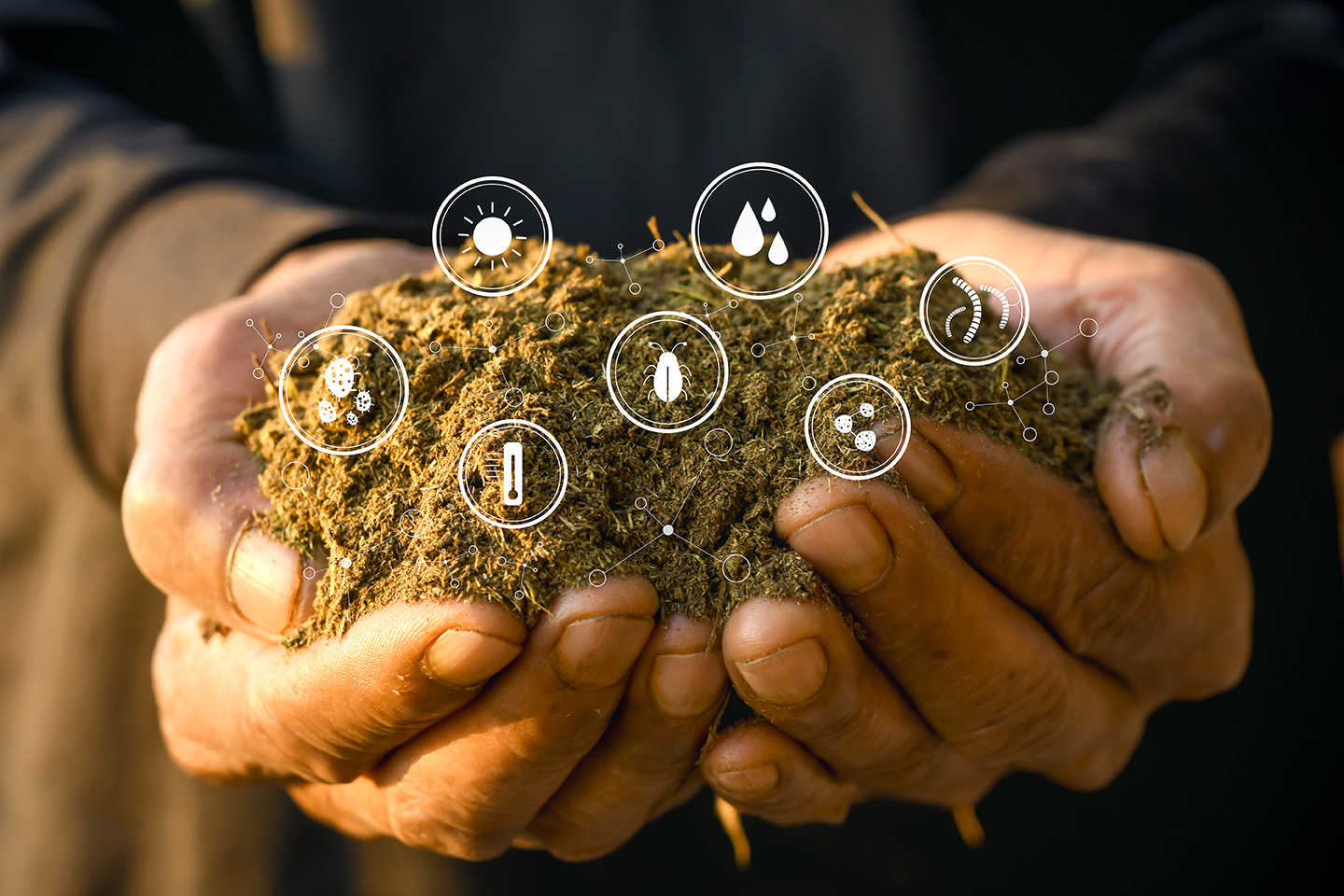SUBSCRIBE TO OUR NEWSLETTER
Suscríbete a nuestro newsletter
Last issue articles
- Biome: the space gaining protagonism in biological strategies for crops
- The export dynamics driving the Mexican biologicals market
- New model developed to evaluate effects of two or more biostimulants combined in a single crop
- Dr. Wagner Bettiol and the biocontrol market in Brazil
- Las propiedades que hacen del Trichoderma un socio clave en la búsqueda de mejores desempeños en los cultivos
- Changes in the new regulation on fertilizers and biostimulants in Chile
- Innovak Global, the expansion of root specialists
Market movers
- Renewable-based nitrogen fertilizer firm raises US$ 20 million in investment round
- Bayer and Ginkgo Bioworks close agreement to strengthen open innovation platform for agricultural biologics
- Argentinean firm Puna Bio: Millions raised to study superbacteria for agricultural use
- Corteva Agriscience signed an agreement to acquire leading biologics company Symborg
- Brazilian study uncovers ants' potential in crop protection
- Huber acquires specialty plant nutrition producer Biolchim
- UPL announces agreement to distribute bioprotector based on orange oil
- ICL and Lavie Bio start strategic collaboration to develop new biostimulants
- Hortitool and Green Smile to organize the Morocco Berry Conference 2022

Tras el ‘boom’ hoy es un sector maduro
Chile's bioinputs market aims to enter into new stages of innovation and development
In one of Latin America's most sophisticated markets for agricultural biologics, players are looking to move beyond the first generation of formulations created to replace traditional chemicals. They are now targeting new uses and objectives, and transforming themselves into international players.
Felipe Aldunate M.
"It is a microcosm that was created 4 billion years ago and that we barely know about. This is how Paulo Escobar describes what he considers to be the next frontier of bioinputs in Chile: the soil. "Today we barely know 1% of what happens inside the soil, even though it is key to the life of the plant". As founder and president of BioNativa, one of the first bioinputs companies in Chile with 20 years of existence, Escobar says that products of biological origin, protection and stimulation of plant growth have had a relevant advance in the country. But in order to continue expanding in the future, he believes that the point of view has to change. "The future growth of this segment will not come from looking so much at the plant, but from discovering what is going on underneath it," he says. "You have to work more with the soil."
Escobar is not the only one in Chile who is thinking about new areas for bio-input development in Chile. The small South American country has developed a world-class fruit export industry and has become an efficient testing ground for trials and validation of biological products in crops.
Industry players agree that the basic categories of bio-inputs are already very close to their potential and, therefore, industry efforts are aimed at new formulations.
“The future growth of this segment will not come from looking so much at the plant, but from discovering what is going on underneath it”
Paulo Escobar, founder and president of BioNativa.
In Chile, the biologicals that exist today as alternatives to chemical products are products that have been maturing and have already positioned themselves very close to their potential. This is what has already happened, as with the issue of Trichoderma, the Bacillus subtilisand others," says Gonzalo Lagos, CEO of bioinputs firm AgroAdvance. "The local market for biologics will start to grow based on new solutions that target new uses that traditional chemicals did not address.
He gives as an example the case of bacteriophages, for Xanthomonas in walnut trees or Pseudomonas in cherry trees, a function performed by biological products that have no counterpart in chemicals. "Biologicals are going to grow because they are going to tackle other problems, they are different solutions to those that already exist," says Lagos.
“The Chilean market already has a lot of salt and sugar and needs new products.”
Romina Almasia, of Ferpac and Red Chilena de Bioinsumos.
"The Chilean market already has a lot of salt and sugar and needs new products," says Romina Almasia, who heads research and development for Fertilizantes del Pacífico (Ferpac). She is also director of the Red Chilena de Bioinsumos, an association of companies and professionals in the area. "There is already a lot of Trichoderma and Bacillus. While we have to have them, the idea is to have new active ingredients and that is what we are working on."
MATURITY AFTER THE BOOM
The search for new solutions is necessary as the market's growth curve flattens and absolute volumes show how small it is. While there are no official statistics, Escobar says that bionsumos in Chile add up to some US$40 million in annual sales, just considering microorganisms and plant extracts, with a growth rate of around 12-14%, somewhat below the 14-16% average for the sector worldwide.
However, the overall market figure does not generate consensus. Entrepreneur Freddy Boehmwald, a well-known biologist who is launching his own bioinputs firm, says the local market is worth about US$ 150 million, all segments considered, citing a report by the Centre for Agricultural Research and Development (CER Rosario). Referring to the same report, Boehmwald says it will reach US$ 300 million by 2025.
"I don't know a general market figure, but we have been growing for quite a few years and although the curve has been slowing down, this is because the volume has been getting more interesting," says Alfonso Besa, marketing manager of Martínez y Valdivieso (M&V), one of the main distributors of organic products in Chile and also present in Peru. "We will no longer see the big percentage jumps we saw 15 or 20 years ago, at the beginning, when the first Trichoderma, the first B. subtilis."
" Although the curve has been slowing down, this is because the volume has been getting more interesting".
Alfonso Besa, marketing manager of Martinez y Valdivieso
Besa points out that today all players in the agricultural bio-input industry already have their own line of biologicals, combining locally produced and imported products.
"In Chile, there are biological products that are so accepted that they are not even considered biological any more, because they seem traditional Today," says Eduardo Donoso, who co-founded BioNativa. "Nobody questions the fact that seaweed solutions are used in the fields and not a photosynthesis amino acid; the same goes for humic acid."
Besa, from M&V, points out that there are categories that have been filled with bio-inputs, as is the case of bio-controllers for the Botrytis cinereaThe pathogenic fungus, which is especially strong on grapevines. "In Chile, the number one disease is Bortrytis," he says. "It is especially strong in table grapes, but it is also catching on cherry. There are several fungus-based solutions, such as Trichodermaor with bacteria, such as B. subtilisor with extracts, which are competing to gain space in that use; there is a lot of product being positioned there and replacing synthetic products, with equal or greater effectiveness.
This is a key aspect, say industry players. While large international supermarket chains demand a reduction in the chemical trace in the fruit they buy, which encourages producers to use more organic products, their growth in Chile would not have been possible without equivalent performance to the traditional chemical one.
"The input buyer is very sophisticated and demands results: many of us in this business have had to demonstrate that the effectiveness of our products is equal or superior to the traditional chemical option," says Escobar. "It has been the good results that have driven this segment."
Señala que de hecho en su paleta hay productos que han superado el desempeño de productos químicos tradicionales. Es el caso, señala, de Nacillus, un bactericida biológico, compuesto por cepas nativas de los biocontroladores Bacillus spp. y Brevibacillus brevis, con acción sobre bacterias fitopatogénicas. También es el caso de Mamull, un fungicida biológico que se aplica sobre los cortes de la poda, y cuyos hongos colonizadores de heridas evitan la acción de hongos fitopatógenos. Con aplicación aérea, esta es una función que los químicos tradicionales no tienen cómo abordar a menos que se “pintara” a mano cada corte de poda realizado en cada planta.
M&V's Besa adds that there is also growth in the control of Pseudomonas, bacteria that cause cancer in cherry trees, and other novel solutions, such as Gluben, a biostimulant based on bacteria that fix nitrogen in the leaf. "You apply the bacteria and it symbioses with the leaf itself; it delivers atmospheric nitrogen to the plant, which in turn delivers sugar to the plant.
GLOBAL LEAP
The development of bioinputs in Chile has been accompanied by the growth of a number of companies that have managed to connect the genetic industry with the needs of the countryside. This is no small challenge. Donoso, from BioNativa, points out a common problem in the bioinput companies that have emerged is that they are overly biologically and under-agronomically loaded. This means that many formulations that work well in the laboratory cannot withstand extended storage times, transport and logistics until the product reaches the tractor.
In contrast, Freddy Boehmwald points out that there is another group of companies that are too agronomically oriented, and leave out the biogenetic industrial process that allows the product to be industrialised, scaled up and marketed.
However, with years of good results, bio-input companies have gained confidence among producers because they have overcome critical requirements for these solutions, such as shelf life. "The shelf life cannot be 30 days; that does not fit with the long times needed for agronomic use," says Escobar. "Chilean companies are already managing to develop solutions with an adequate shelf life."
This has allowed, on the one hand, local companies to compete well with the foreign supply that is quickly made available through the big distributors. "There are a number of products that are local that are quite well developed and compete on an equal footing with products that are international," says Boehmwald. "The Bacillus that Bayer or Syngenta produce compete on a level playing field with those produced by BioNativa, for example.
"There are a number of local products that are quite well developed and that compete on equal terms with international products".
Freddy Boehmwald, biologist and entrepreneur.
Part of this community of new companies comes together in the Red Chilena de Bioinsumos (Chilean Bioinputs Network), an organisation that started in the academic world and has been joined by other companies. "We are a small organisation, with two or three companies joining each year," says its director Romina Almasia. Today there are about 20 people and 20 associated companies. They discuss technical issues, answer queries on regulatory processes and from time to time they get together to hold a 'Bioinsumos & Wine' session, a social event for planned or spontaneous conversations on the sector's issues.
The Chilean bio-input business ecosystem has allowed a handful of its companies to cross borders to export or even establish themselves in other countries. In the case of BioNativa, 20% of its revenues are exports, mainly to Peru and Central America. In the case of AgroAdvance, international growth has focused on Peruvian table grapes. Botanical Solutions, which produces a fungicide based on quillay extract, reached an agreement with Syngenta to distribute its product internationally. There is also Andes Ag, a Chilean firm that developed an innovative technology that allows its bacteria to stay alive longer inside a seed and raised US$8 million in the US.
The Chilean bioinputs business ecosystem has allowed a handful of its companies to cross borders to export or even establish themselves in other countries.
However, players in the sector say that the most interesting is yet to come. That's according to Escobar, which, in addition to its current portfolio of 11 products, has 17 products that are expected to be launched in the medium term. While a good part of them are biopesticides, half of those products are aimed at a new category of bioremediators: biological formulations that protect plants from stresses and diseases caused by climate change. "It's a new use, which traditional chemicals can't take on," he says. "They are different from biostimulants and biofertilisers, because they target functions that traditional inputs cannot perform.
SUBSCRIBE TO OUR NEWSLETTER
Suscríbete a nuestro newsletter
Last issue articles
- Biome: the space gaining protagonism in biological strategies for crops
- The export dynamics driving the Mexican biologicals market
- New model developed to evaluate effects of two or more biostimulants combined in a single crop
- Dr. Wagner Bettiol and the biocontrol market in Brazil
- Las propiedades que hacen del Trichoderma un socio clave en la búsqueda de mejores desempeños en los cultivos
- Changes in the new regulation on fertilizers and biostimulants in Chile
- nnovak Global, la expansión de los especialistas en la raíz
Market movers
- Argentinean firm Puna Bio: Millions raised to study superbacteria for agricultural use
- Corteva Agriscience signed an agreement to acquire leading biologics company Symborg
- Brazilian study uncovers ants' potential in crop protection
- Huber acquires specialty plant nutrition producer Biolchim
- UPL announces agreement to distribute bioprotector based on orange oil
- ICL and Lavie Bio start strategic collaboration to develop new biostimulants
- Hortitool and Green Smile to organize the Morocco Berry Conference 2022
About us
Biologicals Latam es una revista digital trimestral de Redagrícola que informa de manera especializada sobre la intensa actividad que se está desarrollando en el espacio de los bioinsumos para la producción agrícola. Esta publicación es complemento del Curso Online de Bioestimulantes y Biocontrol y las conferencias que este grupo de medios realiza en torno al tema.








